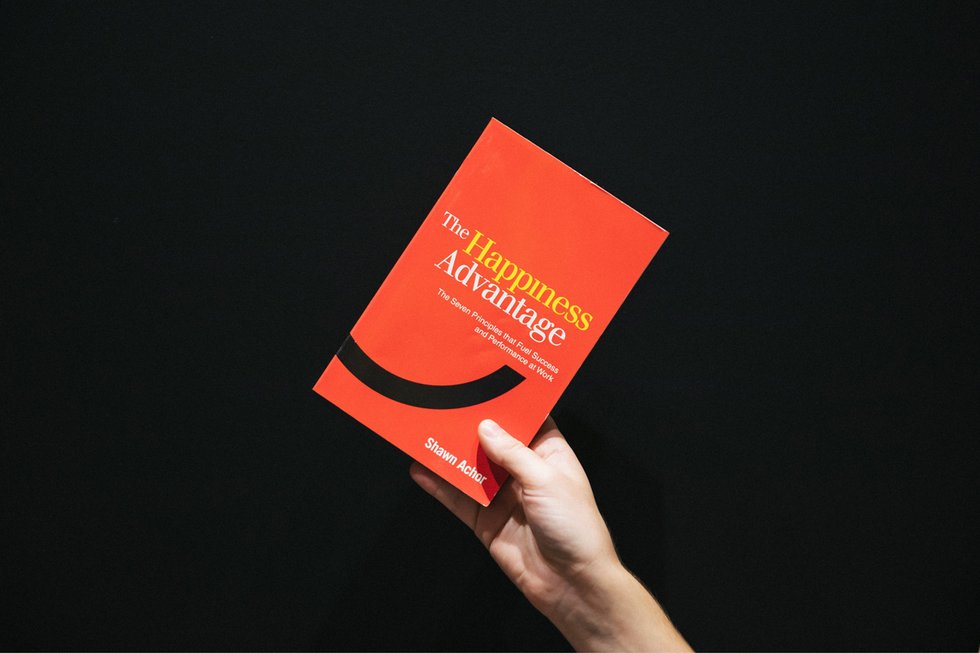Sunny Side Up: The Power of Happiness In The Workplace
Oct 22, 2019
5 mins

AD
Fondateur, auteur, rédacteur @Word Shaper
Which came first, the chicken or the egg? Centuries of debate have failed to come up with a definitive answer. Similar dilemmas exist in psychology; for example, will success really make us happy, or does being happy lead to more success? We are often taught that we must work hard to achieve our goals, and that such achievements will make us feel fulfilled and happy in return. From this perspective, it is success that determines our very happiness. In his book, The Happiness Advantage, Shawn Achor takes the opposite approach. After studying happiness for 12 years at Harvard, he has come to believe that being happy in the first place lays the foundations for success. Here are some principles of positive psychology which, according to this American professor, fuel success and performance at work.
The fulcrum and the lever
Shawn Achor’s book reminds us that there are always two ways of looking at things that happen to us. It’s a bit like the “glass half empty, glass half full” theory. It is up to us if we want to develop relatively positive thoughts about events and let them guide us towards positive consequences, or to focus on negative thoughts that lead to negative events. For example, if you worry about the shortcomings of a project, chances are your presentation will fail. Conversely, you can choose to focus on its strengths before presenting the project to your superiors or colleagues. This will boost your confidence, which makes it more likely that your infectious enthusiasm will win over your audience.
Similarly, in The Happiness Advantage, Achor explains that there are three ways to approach work. We can either look at a job as just a way to earn a living, in which case we are likely to remain pretty mediocre at it. We can see it as part of our career development, and look beyond everyday tasks to envisage a career path and the possibility of professional development. Or, finally, we can approach our work as a vocation, as something which holds true meaning for us. With this attitude, we will be in a better position to excel.
Achor interviewed janitors working at several universities. Some felt that they were just minions, and this attitude made their work quite grueling. Others, meanwhile, saw themselves as the cornerstones of a well-organized university and a key part of the well-being and success of its students. The same work, but two different mind-sets, or positions of the fulcrum, according to Achor’s theory.
The Tetris effect
Habitual behavior exposes the brain to regular thought patterns that it is conditioned to follow. If you keep telling yourself you don’t have what it takes to lead a team, your brain will automatically lean towards this way of thinking. If you are convinced this is the case, you could miss out on opportunities to achieve this goal. This is known as a self-fulfilling prophecy.
However, as Achor explains in his book, the Tetris effect is a way to train our brains to find solutions for each situation. In Tetris, we move and rotate colored blocks so they slot next to each other. We can follow the same approach in our personal or professional lives. Instead of telling yourself, “I’m no good at leading, I’ll never be a manager,” turn it around and say, “I have empathy, and I know how to communicate. I may lack some skills, but with the right training, I could be a good manager.”
Ultimately, the Tetris effect is about getting into the habit of positive thinking instead of surveying your surroundings through a veil of negativity. Although it’s often easier said than done, remember that the more you train your brain to navigate tricky situations, the more agile it will become, and the easier it will be to let go of a limiting mind-set.
Learn from failure
Put in another way, “What doesn’t kill us makes us stronger.” In 2009, Coca-Cola CEO Muhtar Kent listed the multinational’s failures at the annual investor convention. His intention was to show that some projects fail, but that these failures are an integral part of the group’s greatest successes. They provide thought-provoking lessons to be learned for future projects.
Once again, it’s all about mind-set. Faced with a tough situation, our brains make up various scenarios and try to predict the future. For example, “If I try to negotiate with this difficult client, there’s a risk negotiations will shut down.” The alternative is to consider potential failure as one more step towards success, as long as you don’t let the failure take over. Moreover, if we can’t see a favorable outcome for a situation, we tend to give up more easily and become increasingly discouraged moving forward. Achor advises seeing failure not as “falling down” but as “falling up” for happier outcomes.
The virtuous cycle
When we succumb to stress, it’s easier to lose control. In his book, Achor explains that we are more likely to have defeatist thoughts when faced with an overwhelming goal. To avoid this, we should keep the stakes small by dividing a large project into smaller steps, in a similar way to the Kaizen method. We can then applaud every small victory until we reach the final goal. By initially limiting the effort required, we accumulate knowledge, experience, and a sense of accomplishment, which creates a cycle of positivity.
To use a non-work example, if you decide to take up the guitar and hope to play a Jimi Hendrix riff on the first day, you risk being quickly disappointed and discouraged. However, if you start by focusing on a smaller goal, such as practising for at least 20 minutes a day, it will be easier to stick at it and ultimately achieve your end goal. After a month at this pace, you’ll feel satisfied and confident. You can then expand your repertoire and challenge yourself with more complicated songs.
The 20-second rule
We are all creatures of habit, and when it comes to changing habits, our brains resist. Scientists generally concur that it takes 21 days of practice to implement a new habit in daily life. To use the example of learning the guitar that Achor develops in The Happiness Advantage, even if you set an achievable goal of practising for 20 minutes a day, you still have to make the effort to get your instrument out on a daily basis. Achor decided to try it for himself. After only four days, he had given up his good resolutions and left his guitar gathering dust in the closet.
The idea of the 20-second rule is to find a way of breaking through the final barrier of our natural resistance to change. For example, Achor got a stand so he could display his guitar prominently in his living room instead of keeping it out of sight. In doing so, he eliminated that extra 20 seconds it took to decide to take the guitar out of the closet before he started playing. From that moment on, he played every day for 21 days, until this ritual became a habit.
The 20-second rule also works to help you break bad habits by making them less accessible. Let’s imagine the following example, which is totally fictitious, of course. You are addicted to your smartphone and decide to reduce your screen time so you can be more focused at work. If you leave your phone out in front of you, it will be almost impossible to resist the temptation to pick it up. However, if you go to greater lengths and shut it away in another room, you will have to get up, walk to that room and unlock the door to retrieve your phone. The whole process will be long enough for your brain to give up the urge to look at your notifications every four minutes.
Ultimately, Shawn Achor’s book on the brain is a reminder of one simple fact: everything is relative. We are familiar with this concept, but it’s not always easy to trigger a cycle of positive thoughts in certain situations. At the same time, it’s up to us how we want to approach our reality. Scientific and psychological studies have proven the benefits of opting for a positive mind-set; it helps us to be happy and, in turn, makes us much more able to succeed, no matter what the challenge. As always, practice is key, and the goal is to regain control of your brain in order to limit automatic, negative thoughts that can eat away at ambitions, and creativity, and creep into our everyday lives. So, on your marks, get set—think positive!
Translation by Andrea Schwam
Photo by WTTJ
Follow Welcome to the Jungle on Facebook and sign up for our newsletter to receive our articles every week.

More inspiration: Thrive at work

Dans une carrière, mieux vaut avoir des regrets que des remords !
Avoir des regrets est humain, voici comment les exploiter pour mieux les vivre au quotidien.
Sep 21, 2023

Stresslaxation: when trying to relax stresses you out more…
While stress has been declared Public Enemy Number 1, some health experts suggest our obsession with relaxation is making it worse.
Aug 31, 2022

Outside the box: neurodiversity and the changing workplace
How is our current working culture adapted to neurodiverse workers? And what impact did Covid-19 have on neurodiversity in the office?
Apr 06, 2022

The (subtle) art of not caring at work
It's not exactly 'not caring' but rather, drawing the line. Here is how these three happy and successful professionals put their foot down at work.
Sep 22, 2021

The EQ obsession: does it help or harm neurodivergent workers?
What is EQ and why should it be the same for all? Let's look at it from the eyes of 4 neurodiverse professionals and their experience with it at work.
Sep 15, 2021
The newsletter that does the job
Want to keep up with the latest articles? Twice a week you can receive stories, jobs, and tips in your inbox.

Looking for your next job?
Over 200,000 people have found a job with Welcome to the Jungle.
Explore jobs